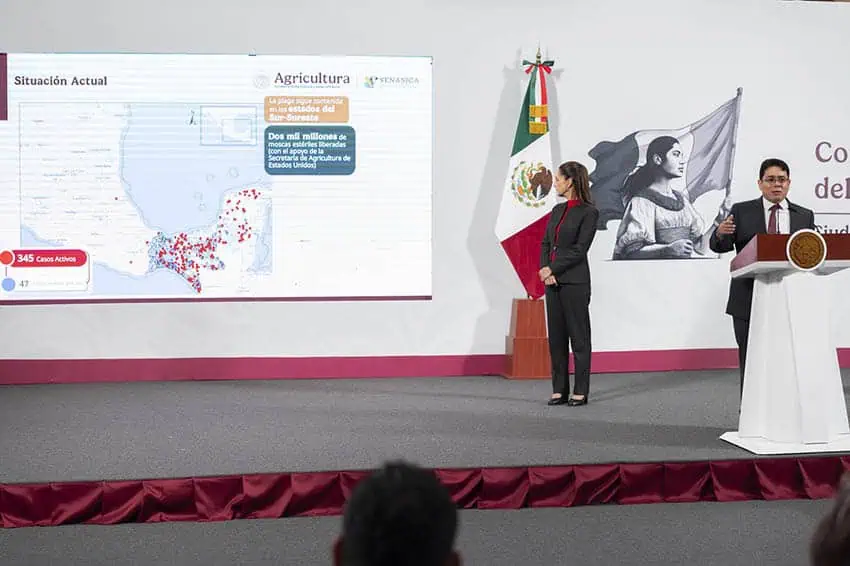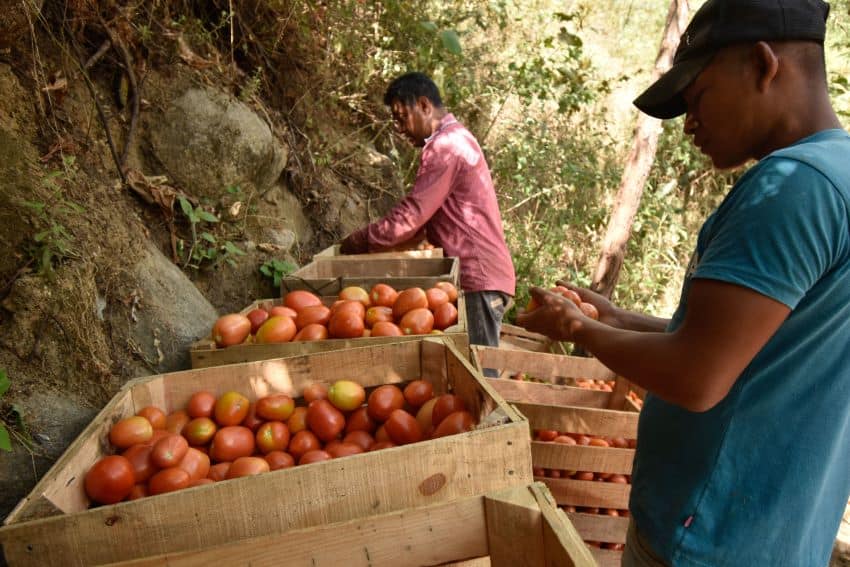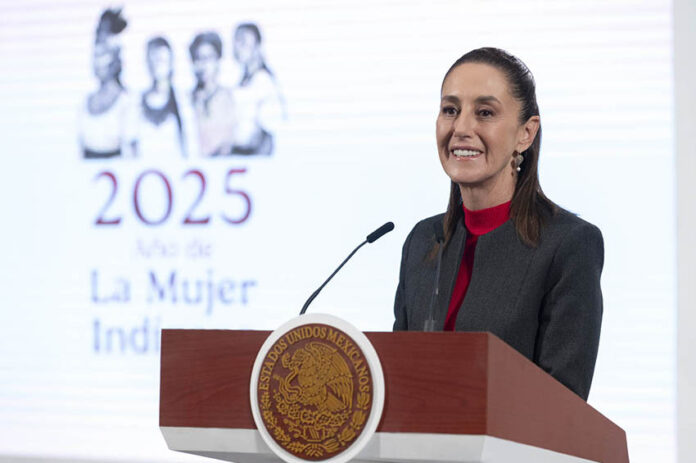A new screwworm case in Mexico, job losses and the looming expiration of a tomato trade agreement were among the issues President Claudia Sheinbaum spoke about at her Thursday morning press conference.
Here is a recap of the president’s July 10 mañanera.
Sheinbaum: US decision to once again halt Mexican cattle imports due to screwworm threat ‘totally exaggerated’
On Wednesday, the United States Department of Agriculture (USDA) announced that Agriculture Secretary Brooke Rollins had ordered “the closure of livestock trade through southern ports of entry effective immediately.”
In a statement, the USDA noted that Mexico’s National Service of Agro-Alimentary Health, Safety, and Quality (Senasica) reported on Tuesday “a new case of New World Screwworm (NWS) in Ixhuatlán de Madero, Veracruz in Mexico, which is approximately 160 miles northward of the current sterile fly dispersal grid, on the eastern side of the country and 370 miles south of the U.S./Mexico border.”
“This new northward detection comes approximately two months after northern detections were reported in Oaxaca and Veracruz, less than 700 miles away from the U.S. border, which triggered the closure of our ports to Mexican cattle, bison, and horses on May 11, 2025,” the USDA said.
The department said that while it “announced a risk-based phased port re-opening strategy for cattle, bison, and equine from Mexico beginning as early as July 7, 2025, this newly reported NWS case raises significant concern about the previously reported information shared by Mexican officials and severely compromises the outlined port reopening schedule of five ports from July 7-September 15.”
“Therefore, in order to protect American livestock and our nation’s food supply, Secretary Rollins has ordered the closure of livestock trade through southern ports of entry effective immediately,” the USDA said.
At her press conference on Thursday, Sheinbaum expressed her disagreement with the decision.
She said that upon finding out about the new screwworm case in Veracruz, the United States government took, “from our point of view” a “totally exaggerated decision to once again close the border.”
“In any case, what do we do? Well, the technical teams immediately get back to work to demonstrate that [the screwworm situation] is under control and that everything that scientifically and practically should be done is being done,” Sheinbaum said.

She said that Agriculture Minister Julio Berdegué — who didn’t attend Thursday’s press conference due to illness — is in “permanent contact” with Secretary Rollins, and “we hope that the border will be opened again very soon.”
Sheinbaum said that the latest screwworm case in Veracruz was attended to “immediately.”
“As the director of Senasica rightly says: veterinarians arrive, there is a team, there is a care protocol; sterile flies are released so that this pest does not spread. So, all the protocols are being followed,” she said.
Sheinbaum seeks to allay concerns about job losses
A reporter noted that Mexico lost more than 46,000 formal sector jobs in June, the third consecutive month that the size of the country’s formal sector workforce shrank.
Sheinbaum declared that “the trend will change,” asserting that public and private infrastructure projects as well as housing projects “will enable employment to grow.”
She highlighted that the number of people in formal sector jobs at the end of June was higher than a year earlier, and therefore there has been job growth over the past 12 months.

The president is correct, although the formal sector workforce only added 6,222 jobs in the 12 months to the end of June, representing an annual growth rate of just 0.03%, according to the Mexican Social Security Institute.
Sheinbaum attributed job losses in recent months to the “tariff decisions” of the United States, which has imposed duties on imports of steel, aluminum and cars from Mexico.
“But we have Plan México, which is going to work,” she said, referring to the government’s ambitious economic initiative.
“And this year, in particular, the trend will change due to construction [projects], among other things,” Sheinbaum said.
“Any country in the world, when it has a situation like these, immediately activates construction,” she said, adding that the government will build 182,000 homes in Mexico this year.
She said that the construction of new houses “will help us a lot” in job creation.
“And it must be said that [vehicle] exports increased in June. So a part of exports that could have declined due to tariff measures is recovering,” Sheinbaum said.
No deal yet to avert US tomato tariff
A reporter noted that Mexico’s agreement with the United States on tomato exports is set to expire on July 14, paving the way for the U.S. to impose tariffs on Mexican tomatoes.
The U.S. Department of Commerce (Commerce) announced in April its intention to “withdraw from the 2019 Agreement Suspending the Antidumping Investigation on Fresh Tomatoes from Mexico.”

“… With the termination of this agreement, Commerce will institute an antidumping duty order on July 14, 2025, resulting in duties of 20.91% on most imports of tomatoes from Mexico,” the department said.
Sheinbaum said that Mexican authorities “have worked a lot with the United States government” and that “tomato associations from different parts of the country, particularly Sinaloa, have also been working and have been in contact” with U.S. authorities.
However, no deal to avert the imposition of the tariff has yet been reached.
Sheinbaum said that between 70% and 80% of tomatoes consumed in the United States are exported from Mexico and therefore “it’s not easy to substitute them.”
“Firstly, due to the quantity, the volume, and secondly due to the quality,” she said.
“… They’re going to get angry if they produce elsewhere, but tomatoes from Sinaloa are difficult to replace,” Sheinbaum said.
“So, beyond the decisions that the United States government takes, it’s not so easy to substitute [Mexican tomatoes], they’re going to have to continue importing,” she said.
By Mexico News Daily chief staff writer Peter Davies ([email protected])
